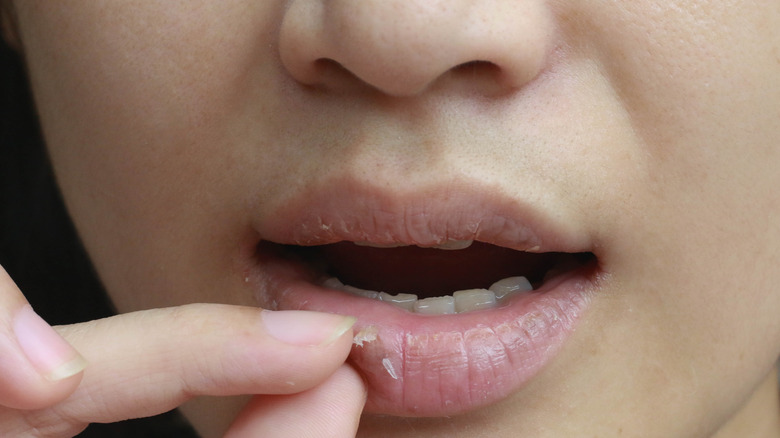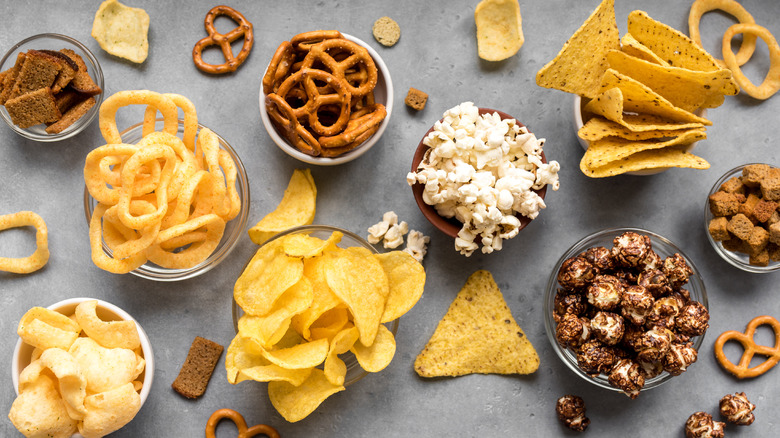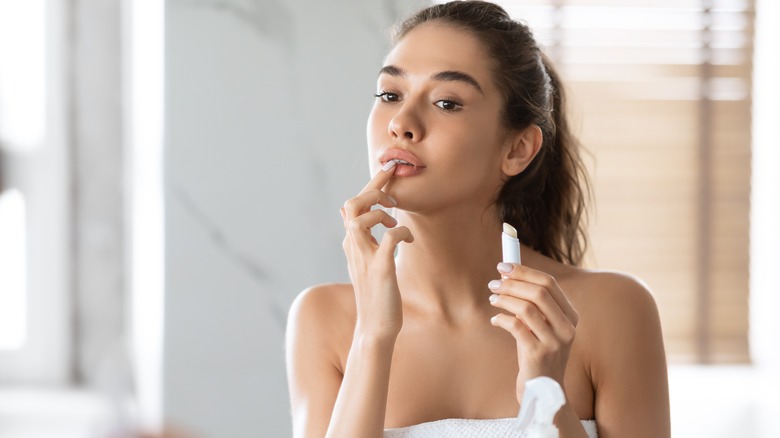Sneaky Foods That Are Drying Out Your Lips
Dry lips are a common complaint, especially during the cold season. Some people may also experience a burning or tingling sensation, flaking, itching, or mild pain. As the Cleveland Clinic notes, our lips are more sensitive than other body areas because the skin covering them doesn't produce sebum. Therefore, they're in direct contact with the air, snow, rain, and environmental allergens. Certain conditions, such as thyroid disease and iron or vitamin B deficiencies, may contribute to this problem, too.
On the positive side, there are steps you can take to prevent dry, chapped lips. The American Academy of Dermatology Association (AAD) recommends using a topical ointment or lip balm that contains moisturizing ingredients, such as hemp or castor seed oil, white petroleum jelly, shea butter, or ceramides. At the same time, it's important to avoid irritating ingredients like menthol, eucalyptus, lanolin, and salicylic acid. Also, note that dehydration and sun exposure can further dry out your lips. In some cases, this issue may be due to an underlying condition or allergic reaction, says the AAD.
Not surprisingly, certain foods and beverages can make your lips dry. For example, the AAD advises against using lip products with citrus flavors because they may irritate your skin. The same goes for lemon, grapefruit, oranges, and other citrus fruits.
Avoid these foods and beverages to get rid of dry, chapped lips
It's not uncommon to experience a burning sensation after eating hot peppers, wasabi, or salsa. Generally, spicy foods irritate and dry out the lips, according to HowStuffWorks. Salty foods, such as potato chips, cured meats, and smoked fish, have similar effects. While there's not enough evidence in this regard, researchers believe that salty and spicy foods can indirectly dry out the lips. These products increase thirst, causing you to lick your lips more often than usual. "Salivary glands contain digestive enzymes that might irritate the lips, while moisture evaporating from saliva exacerbates this," dermatologist Evan Rieder, told Men's Health.
The UK's National Health Service recommends cutting down on acidic foods, too. Lemons, oranges, processed meats, dairy, tomatoes, and other acidic foods can irritate your mouth and lips, causing painful lesions. The same goes for cinnamon flavoring, which has an irritating effect on the soft tissues in your mouth.
As mentioned earlier, dehydration can worsen the problem — and that's one of the many reasons you should drink plenty of water. But make sure you also cut back on dehydrating foods and beverages, including deli meats, chips, pretzels, fried meat products, soda, coffee, and alcohol. Sugary desserts fall into this category, too, notes Well + Good. Coffee, for example, increases urine production due to its diuretic effects, explains a 2016 review published in Medecine Sciences via the National Library of Medicine.
Simple ways to soothe dry lips
Now that you know which foods can dry out your lips, try to cut them out of your diet for a couple of days. Meanwhile, start drinking more water and limit sodium. Stay hydrated and avoid common irritants, such as salt and menthol. Also, refrain from licking or biting your lips.
Ideally, use a lip balm or lipstick with a SPF of 30 or higher to protect your lips from sun damage, recommends dermatologist Mary L. Stevenson, per NBC News. She also suggests using a gentle sugar scrub to exfoliate the skin on your lips. After that, apply an ointment to keep them hydrated. "Lip ointments should be reapplied frequently throughout the day so that the lips never feel dry," she added.
WebMD says that petrolatum and dimethicone, two ingredients in lip balm, can soothe dry lips and increase hydration. For best results, apply either an ointment or lip balm before using lipstick. Consider placing a humidifier in your room or office to prevent dry air, a common cause of chapped lips. Apart from that, opt for hypoallergenic lip products without fragrances, oxybenzone, propyl gallate, and other harsh ingredients, recommends the AAD.
If you take these steps, your lips should heal within 2-3 weeks. However, there are cases where it makes sense to see a dermatologist. Sometimes, this problem can be a sign of oral thrush or other more serious conditions that require medical attention.


